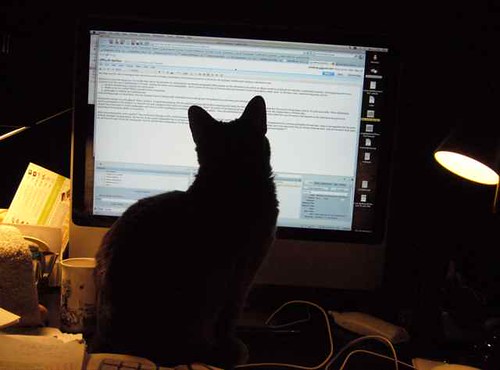Though standard, the term ‘lecture’ does not reflect what I try to do
when I teach. I aim not to tell, but to guide students in their own
learning. From the simplest group discussions to the most complex
in-class mini-assignments, I am always looking for new ways to help
students construct a deeper understanding of a course’s key topics.
In his book ‘What the Best College Teachers Do’ [1], Ken Bain describes
four key concepts that the group of professors studied exhibit in their
own teaching. I believe that these concepts not only reflect my own
philosophy for teaching, but provide inspiration for new ideas when
preparing to teach.
The first is that knowledge is constructed, not received. Reflecting on
my own experiences as a student, I can recall more instances of being
given information than I can of having an opportunity to construct my
understanding. I succeeded because I moved beyond my good memory to seek
out understanding on my own, but I realize that not all students are as
able or motivated to do so. In computer science, there is an abundance
of technical information to know, and it is not always obvious how to
guide students in learning the concepts behind it. Aside from
thoughtfully crafted assignments, interactive activities for small
groups or at the front of the classroom are one strategy I have used
successfully. For example, instead of describing how binary numbers
work, I have guided students in exploring their nature using physical
cards representing binary digits.
The second concept states that mental models change slowly: students
must have their preconceptions challenged and care enough that their
mental models are incorrect to want to update them. I believe carefully
constructing a program in class is one way to accomplish this. In real
time, students can predict what they believe will happen, only to find
that, in many cases, they were wrong. Discussion on why should be
followed by the opportunity to try again. Just-in-time teaching is
another option I would like to try. With this technique, just enough
information to start a task is given. Further information is provided
only when the students realize they need it.
Next is that questions are crucial. I always strive to make myself
available during and after class to answer questions, and ensure that
students feel comfortable asking what they think are trivial inquiries.
When class sizes allow for it, I incorporate group discussions that
involve questioning in both directions. I try to design a line of
questioning that will help students construct their knowledge, and this
is something I hope to continue improving.
Finally, caring is crucial. I find it is very important to ensure that
in-class examples and assignment topics actually reflect what the
students care about. When I teach non-majors, this means connecting
concepts to their fields of study. For all students, I try to design
assignments that give them the freedom to incorporate what interests
them. I also believe there is potential in designing learning
experiences that reflect how video games engage players, such as James
Paul Gee suggests [2]. I would like to try this approach soon, and a
game design course would be the perfect place to do it.
Whether a guide for what happens in the classroom or for the design of
assignments to be completed later, these four concepts help describe how
I see myself as an effective instructor. There are many more
opportunities to incorporate the wisdom contained within them, and I
often look back to them when embarking on a new teaching
endeavour.
--
[1] Bain, K. What the Best College Teachers Do. Harvard University Press, 2004.
[2] Gee, J. P. Good Games + Good Learning: Collected Essays on Video
Games, Learning and Literacy (New Literacies and Digital
Epistemologies). Peter Lang Pub Inc, 2007.
[
Also available on my website.]





